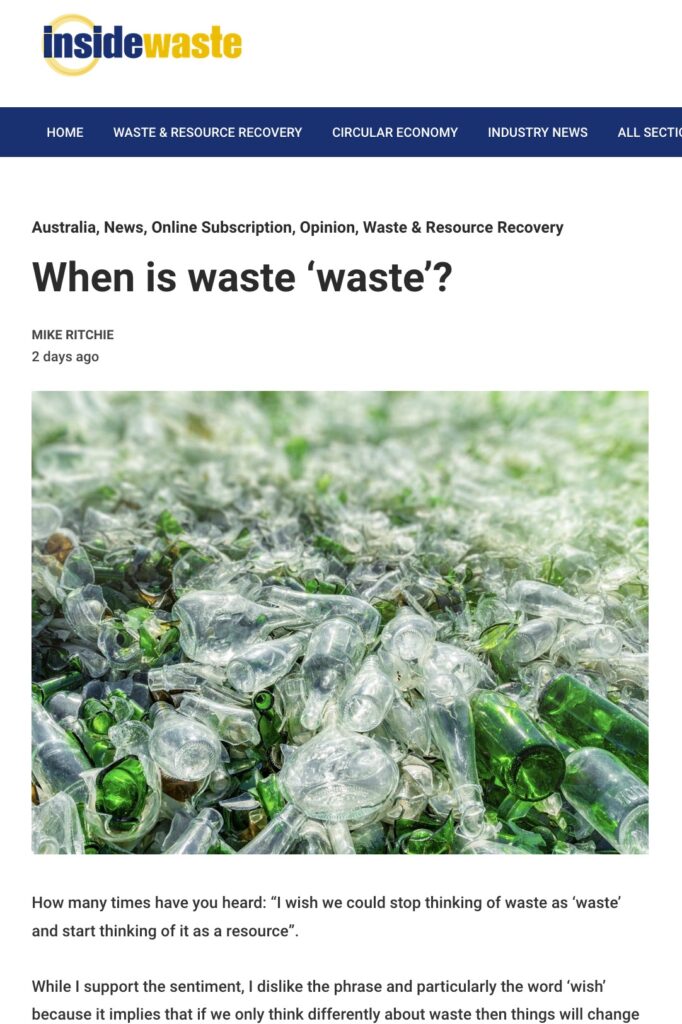When is waste “waste”?
By: Mike Ritchie, MRA Consulting Group

How many times have you heard: “I wish we could stop thinking of waste as ‘waste’ and start thinking of it as a resource”.
While I support the sentiment, I dislike the phrase and particularly the word ‘wish’ because it implies that if we only think differently about waste then things will change for the better. They might change at the margins but not enough. Let me unpack that.
All attitudinal change is to be welcomed but we cannot fool ourselves that that, in itself, will generate reform at the speed that we need it. So I write these articles to try to convince you, the reader, that there are other, stronger forces, that we need to harness to achieve our 80% National Waste Target.
The fact is, waste is ‘waste’ by definition of the fact it is discarded, rejected, unwanted, surplus or abandoned. That is how it is defined in almost all legislation in Australia.
But more importantly, the fact is that ‘waste’ almost always has zero or negative economic value. The generator (of the waste) has to pay someone to get rid of it – whether that is to landfill or EfW.
Ιt will only become a ‘resource’ when it is separated, sorted, cleaned-up and is available as an input to another process.
By definition that requires further input of labour and costs.
So ultimately the distinction between ‘waste’ and a ‘resource’ is the cost of separating it at source, or paying someone else to sort it downstream, then cleaning it and preparing it for a new life.
Tweet
Put another way there is plenty of recycling that happens every day in the economy. These are resources. Most of eBay is recycling. Every second-hand chair or car that is sold, is recycling. Cardboard and plastic sorting and baling at the back of Woolies, is recycling. The distinction is that these materials are homogeneous enough and have economic value (greater than the cost of sorting and purifying) and can be returned to the productive economy by normal market forces based on profit-making businesses.
Waste is different. It has negative economic value and will not be returned to the productive economy as a resource without someone paying for it (over and above its remaining embodied value). Just think about mixed household waste, mixed commercial waste and mixed construction waste. This represents almost all of the 20MT of waste we landfill.
So if we want to start reducing waste and growing recycling then it is important we face the facts that economics drives recycling (not “wishing” it).
Professor Ross Garnaut in his latest book Super-Power: Australia’s Low-Carbon Opportunity (La Trobe University Press, 2019) makes important comments on the power of the market. In his case, he was talking about pricing carbon (via a carbon tax) to drive down greenhouse gas emissions. Exactly the same logic needs to be applied to pricing waste, to drive down landfill and drive up recycling. (Wherever Garnaut says emissions, think waste.)
Reductions of emissions (waste) under the market-based scheme …. will come from everywhere… Lots of people with clever ideas that reduce emissions (waste) will find equity investors and lenders more interested than they were before… Once we put the carbon pricing (waste pricing) incentives in place, millions of Australians will set to work finding cheaper ways of meeting their requirements and servicing markets. We don’t know in advance what the successful ideas will be, but I’m pretty sure that there will be extraordinary developments in technology… That is the genius of the market economy… (Garnaut, 2019).
We need to ensure that we align market pricing with our goals for recycling and waste management. The State and Federal Governments along with local government, have now agreed to a national waste diversion from landfill target of 80% by 2030. That means that by 2030 we need to be recycling an additional 15 million tonnes annually; on top of the current 32MT. That is a massive task in only 9 years.
It simply will not be achieved by “wishing we thought of waste as a resource”. We need to put our skates on.
It will be achieved by getting the market pricing right, by allowing businesses to invest profitably in recovering waste streams and diverting them back into the productive economy. If you don’t believe me try naming an unprofitable recycling business that still exists (without government subsidies).
It will be achieved by Governments requiring wastes to be separated at source, so that they can be efficiently collected, sorted, purified and resold. That is the market economy we live in. That will grow investment and jobs.
ALL of Australia’s current 32MT of recycling happens because it either makes money to do, is cheaper than landfill or in the case of local government, is subsidised by long suffering ratepayers.
Tweet
With the economics of waste and recycling firmly in mind, we need to look at further increases in landfill levies, grants to incentivise investment, Extended Producer Responsibility and other Cap and Trade schemes to drive the market economics.
Selective bans on streams to landfill are also necessary. (My personal view is the most effective ban would be unprocessed organics to landfill. Europe did it decades ago. But that is another article.)
Of course we need to educate, engage and develop policy and programs but they are secondary forces to the economics.
In short, we need to invest over $5B in new technology, systems and processing, in the next 9 years to achieve our 80% target. That means convincing investors, financiers, proponents, Councils etc that they should take risk and invest.
The single most important thing a government could do today is to flag future increases in the landfill levies (followed by mandated organics collections). I congratulate NSW, SA, Vic and Qld who have started on the levy path (in part). (Note that we should also exempt bona-fide recyclers from the levy altogether.)
I say ‘future’ increases because that will bring forward (to today) investment based on the future opportunity cost of landfill. That will encourage businesses, Councils etc to invest, grow and diversify into recycling. It will immediately drive increased recovery of organics, recyclables, food, mixed commercial waste, mixed household waste, mixed construction waste. It will drive at least 20,000 jobs growth in a greener economy.
Pragmatic. Market economics 101. We don’t need to ‘wish’ it, we need to ‘price’ it.
Mike Ritchie, is the Managing Director of MRA Consulting Group.
This article has been published by the following media outlets:




